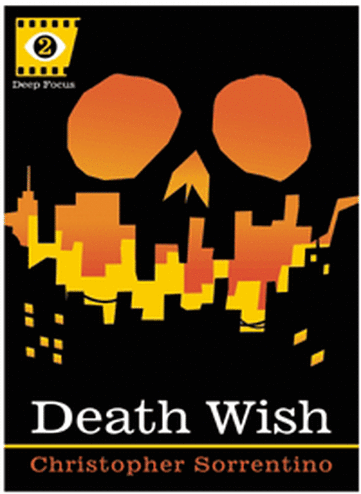YOUR MONEY OR YOUR LIFE.

The fourth collaboration between director Michael Winner and actor Charles Bronson, Death Wish was the apotheosis of a succession of films hitting screens during the seventies—including Bullitt, Dirty Harry, and Walking Tall—that tacked against a prevailing liberal wind in Hollywood cinema. Exploiting audience fears of a bestial “other” infesting American cities, and explicitly linking law and order with a pastoral ideal of the Old West (and exurban subdivisions), its glib endorsement of vigilantism infuriated liberal critics even as it filled theaters with cheering audiences. Christopher Sorrentino examines Death Wish in its various contexts—as movie, as provocation, as social commentary, as political tautology, and as depiction of urban life—and considers its lasting influence on cinema.
"What immediately stands out is the boldness of Sorrentino’s approach...the best compliment I can give this book is that it often led me to argue with myself as much as with the author."
-- Chad Trevitte, Bright Lights Film Journal
"Sorrentino manages to illuminate the film in a way that, while not making it seem any better, makes it far more interesting...Sorrentino is a fine guide, and his unexpected plea for a more even keeled audience (found roaming in a beautiful meander called "Afterthoughts on the Middle Level" that serves as a sort of philosophical conclusion) struck home for this reader in the best way possible."
-- The Factual Opinion
"Like the great James Agee, another novelist turned film critic, Lethem and Sorrentino create distinct personal presences on the page, matching subtle intellects with flexible gifts of description. Both certainly got my brain working overtime in response...It is also refreshing in the extreme to read explorations of any films that are this thorough, this frankly self-searching, and (most importantly) this free of studious reverence for their subjects...What Sorrentino and Lethem pursue in their exuberant little volumes are not works of art, but retrievals of artifact: items whose abiding value is not that they are the canonical masterworks of a guiding author...We are thus invited to explore these movies free of auteur-theory mysticism, and instead experience them as living, breathing things: creations born for a variety of weird reasons, serving any number of talents and agendas, and ripe for a long afterlife as various as our affections and imaginations."
-- F.X. Feeney, Los Angeles Review of Books
An interview in Entertainment Weekly
A round-up in Salon
A review in Three Imaginary Girls
Back to Books
"What immediately stands out is the boldness of Sorrentino’s approach...the best compliment I can give this book is that it often led me to argue with myself as much as with the author."
-- Chad Trevitte, Bright Lights Film Journal
"Sorrentino manages to illuminate the film in a way that, while not making it seem any better, makes it far more interesting...Sorrentino is a fine guide, and his unexpected plea for a more even keeled audience (found roaming in a beautiful meander called "Afterthoughts on the Middle Level" that serves as a sort of philosophical conclusion) struck home for this reader in the best way possible."
-- The Factual Opinion
"Like the great James Agee, another novelist turned film critic, Lethem and Sorrentino create distinct personal presences on the page, matching subtle intellects with flexible gifts of description. Both certainly got my brain working overtime in response...It is also refreshing in the extreme to read explorations of any films that are this thorough, this frankly self-searching, and (most importantly) this free of studious reverence for their subjects...What Sorrentino and Lethem pursue in their exuberant little volumes are not works of art, but retrievals of artifact: items whose abiding value is not that they are the canonical masterworks of a guiding author...We are thus invited to explore these movies free of auteur-theory mysticism, and instead experience them as living, breathing things: creations born for a variety of weird reasons, serving any number of talents and agendas, and ripe for a long afterlife as various as our affections and imaginations."
-- F.X. Feeney, Los Angeles Review of Books
An interview in Entertainment Weekly
A round-up in Salon
A review in Three Imaginary Girls
Back to Books
